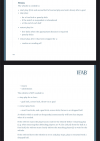Following an injury, should the whistle be used indicate play restarting, if the restart is a dropped ball?
Law (practical guidelines) says that the whistle IS needed to restart play following an injury.
But it is NOT needed for
most free kicks, and a goal kick, corner kick, throw-in or dropped ball
By my reckoning, after an injury stoppage you will always have one of the not needed restarts, which makes listing injury as a reason to restart as pointless.
Am I missing something?
Law (practical guidelines) says that the whistle IS needed to restart play following an injury.
But it is NOT needed for
most free kicks, and a goal kick, corner kick, throw-in or dropped ball
By my reckoning, after an injury stoppage you will always have one of the not needed restarts, which makes listing injury as a reason to restart as pointless.
Am I missing something?






 )
)

